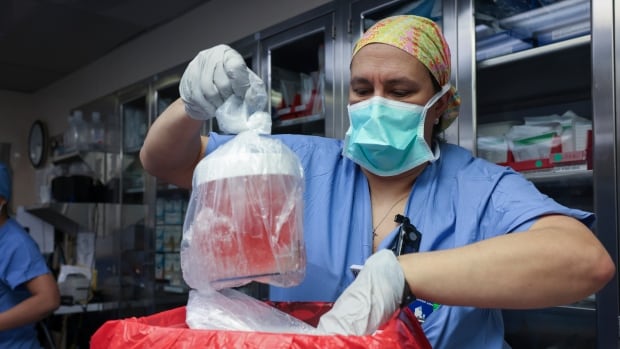A 62-year-man with end-stage renal disease has become the first human to receive a new kidney from a genetically modified pig, doctors from Massachusetts General Hospital in Boston announced on Thursday.
The four-hour surgery, performed on March 16, marks a major milestone in the quest to provide more readily available organs to patients, the hospital said in a statement.
The patient, Richard Slayman of Weymouth, Mass., is recovering well and expected to be discharged soon, the hospital said.
Slayman had received a transplant of a human kidney at the same hospital in 2018 after seven years on dialysis, but the organ failed after five years and he had resumed dialysis treatments.
The kidney was provided by eGenesis of Cambridge, Mass., from a pig that had been genetically edited to remove genes that could be harmful to a human recipient and add certain human genes to improve compatibility.
In addition, the company inactivated certain viruses inherent to pigs that have the potential to infect humans.
Richard Slayman, 62, is the recipient of a genetically modified pig kidney. The medical staff who oversaw the surgery at the Massachusetts General Hospital hailed the successful procedure as a future pathway to achieving equity among patients in need of kidneys.
“I saw it not only as a way to help me, but a way to provide hope for the thousands of people who need a transplant to survive,” said Slayman, a systems manager for the Massachusetts Department of Transportation.
Challenging case
Dr. Tatsuo Kawai, the transplant surgeon, said the team believes the pig kidney will work for at least two years.
Slayman’s kidney specialist, Dr. Winfred Williams, said even before his first transplant, Slayman had trouble being on dialysis and needed dozens of procedures to try to remove clots and restore blood flow.
Williams said that Slayman became “increasingly despondent and depressed over his dialysis situation. At one point … he literally said, ‘I just can’t go on like this.”‘
Previously, pig kidneys have been temporarily transplanted into those who are brain-dead.
Kidneys from similarly edited pigs raised by eGenesis had successfully been transplanted into monkeys that were kept alive for an average of 176 days, and in one case for more than two years, researchers reported in October in the journal Nature.
Drugs used to help prevent rejection of the pig organ by the patient’s immune system included an experimental antibody therapy called tegoprubart.
The pig kidney procedure moves the field of xenotransplantation — the transplanting of organs or tissues from one species to another — closer to becoming a potential solution to the worldwide organ shortage.
In a medical first, surgeons successfully transplanted a genetically modified pig’s heart into a U.S. man in a last effort to save his life.
According to the United Network for Organ Sharing, more than 100,000 people in the U.S. await an organ for transplant, with kidneys in the greatest demand. In 2022 in Canada, nearly 1,800 kidneys were transplanted, more than 2,800 others were waiting and 117 died before they could receive one.
Paul Keown, a specialist in immunology and transplantation and a professor in University of British Columbia’s medicine department, called the hospital’s announcement a truly exceptional advance in both biology and medicine given the dire human need for organs.
“Canada has been focusing particularly on the question of tolerance in native human organs and inducing that, which means then we wouldn’t have to use immune suppression at all,” Keown said.
Keown said he anticipates more xenotransplants will be done over the next decade and he hopes the pig organ and tolerance advances will come together.
Ethicists say other considerations include the possibility of pig viruses spreading to humans and killing animals to save people.








